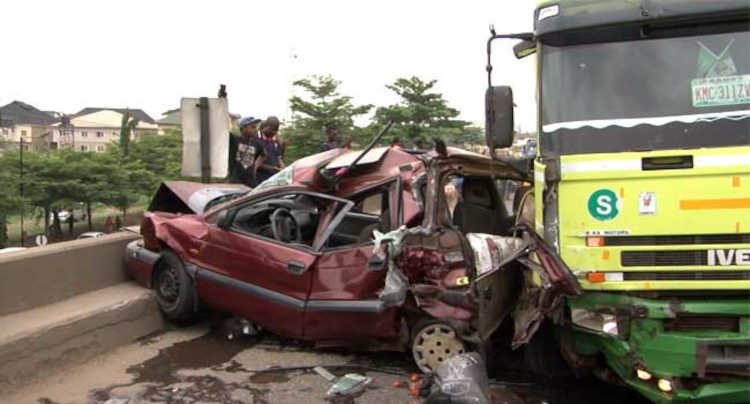As the world commemorates the day for remembrance of road traffic victims, crashes in Nigeria continue to be a significant concern, contributing to injuries, fatalities, and economic losses.
Development Diaries reports that the World Day of Remembrance for Road Traffic Victims is commemorated on the third Sunday of November each year.
Data from the National Bureau of Statistics (NBS) reveals that the total number of road traffic crashes in Nigeria in the second quarter of 2023 was 2,967, indicating an increase of 8.56 percent from the previous quarter which was 2,733.
In May 2023, the Federal Road Safety Corps (FRSC) revealed that over 40,000 people die annually from road traffic crashes in Nigeria.
According to the FRSC, 4,387 people died as a result of road traffic crashes from January to June across 36 states and the Federal Capital Territory (FCT).
Although the FRSC has said that it will strive to cut the number of traffic c rashes by five percent, road traffic crashes are not abating.
It is crucial for road users to adopt comprehensive road safety measures to mitigate the risk of crashes and promote a safer driving environment.
Causes of road traffic crashes
On the part of drivers, excessive speed is a leading cause of road crashes. Some drivers fail to adhere to speed limits and this increases the likelihood of crashes.
Also, aggressive and irresponsible driving behaviours, such as overtaking in dangerous conditions and driving in wrong lanes, contribute significantly to road crashes.
For example, in a recent occurrence, a driver evading arrest by traffic officials killed two street sweepers in Lagos State, southwest Nigeria.
A driver evading arrest by traffic officials on Monday morning killed two street sweepers on the Gbagada-Oshodi Expressway in Lagos State. pic.twitter.com/8M7aOdMyWW
— Channels Television (@channelstv) November 13, 2023
Below is another instance of irresponsible use of roads, as a motorcyclist conveys a cow instead of using a truck.
How Nigerians carry their problem 😁
Zainab ilorin #fcklive Young Duu Keke Palmer Shallipopi Dollar to Naira Omah Lay Snapchat Ministry of Interior • Eniola Genevieve Nnaji • Ilorin Madonna Jay Boogie Manchester United Chris Brown Enugu • Man U Victor Boniface Abuja Airport pic.twitter.com/LRric7nfOC
— Mr Banks on Pi (@enofure27) November 10, 2023
Another problem is poorly maintained vehicles, including those with faulty brakes and lights on roads. Lack of regular vehicle maintenance can lead to avoidable road crashes.
Many drivers on Nigerian roads do not prioritise focus on driving; instead, they are seen using mobile phones while driving, which diverts attention from the road, leading to crashes.
Another problem is the lack of improved infrastructure, which endangers road safety. Many roads in Nigeria are in substandard condition, lacking proper signage and lighting.
Reducing road crashes
Addressing road traffic crashes in Nigeria requires a collaborative effort from government authorities, law enforcement agencies, and the general public.
Drivers must strictly adhere to traffic rules and regulations. This includes obeying speed limits, traffic signals, and road signs.
There is also a need for road users to adopt defensive driving techniques, anticipating potential hazards and taking preventive actions to avoid crashes.
In the same vein, ensuring that vehicles are in good working condition is essential. Regular maintenance checks for brakes, tires, lights, and other vital components can prevent mechanical failures on the road.
Overloaded vehicles are very common sights on Nigerian roads, even though they are less stable and more prone to crashes. Operators of commercial vehicles must adhere to weight limits to ensure safety.
In adhering to safety, seat belts, helmets, and other safety gear must be used at all times. These measures significantly reduce the severity of injuries in the event of an accident.
Pedestrian safety is something that many road users overlook. Pedestrians must learn to use designated crossings, obey traffic signals, and stay alert while walking near roads. Also, drivers must be vigilant for pedestrians and yield the right of way.
Development Diaries urges the FRSC to strictly enforce traffic rules and consistently conduct public awareness campaigns to educate road users about the importance of road safety and responsible driving.
Furthermore, we urge road users to always observe traffic rules and call the FRSC emergency toll-free number (122) when there is a road crash in order to ensure road traffic crash victims receive prompt rescue services on all roads nationwide.
Let’s us join hands to ensure road traffic crash victims receive prompt rescue services on all roads Nationwide.
Call us from anywhere and at anytime (247), when there is a road crash or any special traffic situation.
You can save a life just like @M_Dundere. pic.twitter.com/LW8107iIM5
— FRSC, NIGERIA (@FRSCNigeria) October 30, 2023
Photo source: Channels TV







